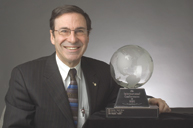AIDS: "We need to do better"
Conference co-chair challenges researchers to stand and deliver

One of the world's prominent AIDS researchers, Mark Wainberg was made an Officer of the Order of Canada in 2001.
COURTESY OF MARK WAINBERG
Dr. Mark Wainberg hopes the upcoming XVIth International Conference on AIDS will live up to its theme, Time to Deliver. "It's time to deliver on all of the promises we've been making to so many people for so many years," said Dr. Wainberg, who will co-chair the AIDS 2006 conference, to be held in Toronto from August 13 to 18.
"Certainly, I want to bring HIV and AIDS to people's minds," said Wainberg, director of the McGill University AIDS Centre at the Sir Mortimer B. Davis - Jewish General Hospital. "But that's not enough: I want the conference to have 'legacy.'" Two landmark AIDS conferences are spoken of often in the field: the 1996 conference in Vancouver, where the world was shown that antiretroviral (ARV) drug cocktails worked and extended people's lives; and the 2000 Durban conference, where, said Wainberg, "We as a world were no longer willing to accept that millions upon millions upon millions of people in developing countries do not have drug access."
AIDS is also a women's issue
Wainberg, who is also a professor of medicine, pediatrics and microbiology, maintains the biennial conferences have important and immediate public health effects because they heighten awareness of the disease. The challenge is to ensure that the information highlighted at the conferences —the Toronto one is expected to draw 20,000 participants — isn't transitory, that "especially to vulnerable peoples of Africa and elsewhere, it will remain ingrained over a lifetime." In those areas, that message isn't just 'use a condom' but is "really about women's issues and women's rights. How women need to be empowered, to have control of their lives, so they can insist on condoms." Much of the problem of HIV transmission "is really due to men's attitudes of superiority which are unfortunately ingrained in many societies." These issues strike closer to home too: consider [Canadian] sex trade workers whose clients insist on condom-free relations.
A tale of two syndromes
In developed nations, AIDS is "now a chronic disease, more or less manageable for most." Wainberg likens AIDS to diabetes, with ARVs substituting for insulin. "HIV is not a picnic. And diabetes — ask anybody — is no picnic either. There's no guarantee you'll live to be ninety if you have it." But Wainberg is hopeful that a 20-year-old Canadian infected today, who complies well with treatment, is likely to "die of a heart attack or cancer, something totally unrelated to AIDS."
In developing countries, the story is different. Though the number of people on ARVs has gone from 7,000 in 2000 to 400,000 today, those who need treatment is closer to 10 million. That requires serious money and "a political response of huge dimensions." Such a response is also crucial for vulnerable people in developed countries, such as Canada. "About one third of all new HIV infections in this country occur among aboriginal people." Wainberg hopes the list of speakers — including Bill Gates, Bill Clinton and, possibly, Prime Minister Harper — will translate into the loosening of purse strings.
For more on the conference, see www.aids2006.org

